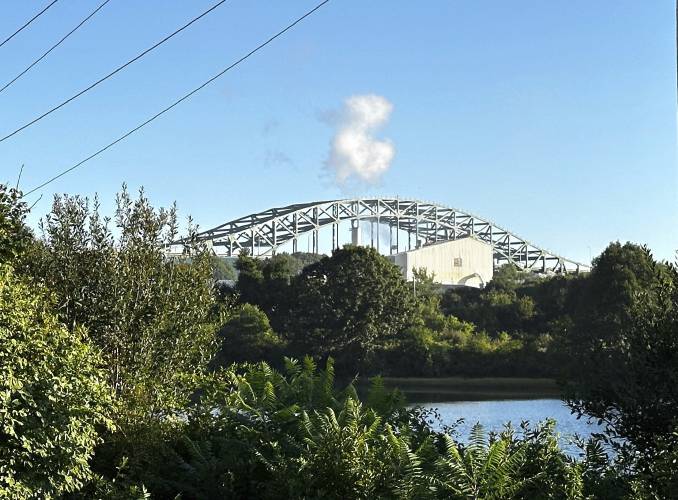Opinion: Stewards and kindred living together on the earth

The Piscataqua River Bridge is shown in Portsmouth. Caleb Jones / AP
| Published: 12-07-2024 6:01 AM |
John Buttrick writes from his Vermont Folk Rocker in his Concord home, Minds Crossing.
Thanksgiving weekend we traveled to Portland, Maine to visit our daughter, son-in-law, and our two grandchildren. We drove over hills and through woods passing by villages and small towns in the valleys. At Portsmouth, we crossed over the Piscataqua River.
Driving across the drawbridge was like going through a tunnel of crisscrossed steel girders bolted together. Peering past the gaps between the girders, we could see cranes reaching up from the shipyard, large ocean-going vessels, sailboats and small fishing boats, and riverside seating for seafood restaurants. The scene was a preview of the view to come in Portland.
Driving into Portland we observed the changes humans have wrought on the river and coastal ecology. There are huge oil storage tanks, shipyards with sky-scraping cranes, and city-size cruise ships. There is an expanse of shipping containers, and warehouses clinging to the shoreline. There are tall fire-breathing smokestacks, a maze of pipelines, and buildings revealing, through broken windows, dark profiles of idle machinery. There are stacks of construction materials, and parking lots overflowing with cars and trucks. We passed large office buildings, shopping malls, and high-rise apartments and condominiums. There was practically no evidence of vegetation or the soil of the earth until we finally reached the suburban neighborhoods and our destination.
Perhaps it was the anticipated scene of the family gathering, or the gratefulness for the gifts of food and shelter surrendered from the earth, or the stark contrasts of views materializing along the sides of the road from Concord to Portland that awakened in me an awareness of the multifaceted ways human beings have wounded and disfigured the land.
I mused that while the flora and fauna of the earth have slowly evolved over millions of years, in only the last two centuries human beings have transformed much of the land, air, and water into a new alien environment. I noted that the Portland landscape is only a microcosm of the human footprint on the earth: sprawling metropolitan complexes, industrial zones, monoculture farms, research facilities, weapons for mass destruction, vehicles for space travel, and an amazingly complex infrastructure of roads, electric wires, and micro wave towers crisscrossing the land. No other living creature has ever impacted the earth so extensively and in such a brief time as human beings!
My musings ended up as a dish on the Thanksgiving table. We reflected that the scope of changes to the earth’s environment is contributing to the potential of irreversible pollution and global climate change. You know the list of the effects of these changes: global warming, melting icebergs with sea level rise, rerouted ocean currents, floods, wildfires, and increasingly more powerful storms. The discussion turned to how human beings might affect a change in this ongoing trajectory toward a land uninhabitable for human beings.
The conversation surfaced two differing philosophies contributing to climate change. One was the concept of stewardship. This idea of being the ones in charge of caring for the earth has led to a corrupt understanding of the earth as humanity’s oyster, its resources to be managed for the exclusive use of human beings. The second philosophy is that humans are kindreds to the earth, an integral part of the earth with the obligation and responsibility to cooperate with the ways of creation. This philosophy may be corrupted by the misunderstanding that cooperation means noninterference; letting environmental events happen as they will.
Article continues after...
Yesterday's Most Read Articles
 One person trapped, killed in Manchester Street fire
One person trapped, killed in Manchester Street fire
 Ayotte vetoes bathroom bill, defeating it for second time in two years
Ayotte vetoes bathroom bill, defeating it for second time in two years
 Concord may finally buy long-closed rail line with hopes of creating city-spanning trail
Concord may finally buy long-closed rail line with hopes of creating city-spanning trail
 Free speech group, residents back Bow parents’ appeal in case involving transgender athletes
Free speech group, residents back Bow parents’ appeal in case involving transgender athletes
 Concord city council divided over raise for city manager to nearly $250K
Concord city council divided over raise for city manager to nearly $250K
 Cannon Mountain tram to shut for at least two years while replacement is installed
Cannon Mountain tram to shut for at least two years while replacement is installed
Therefore, when seeking a pathway for the rejuvenation of the earth, it may be important to let the two different philosophies influence one another. Actions of stewardship must include the humility of kindred, recognizing that humans are part of the earth not dominant over it. And kindreds of the earth must be influenced by an active urgency of the steward, to participate with Mother Nature rather than just let things be.
We can no longer ignore the immense impact humans have upon the environment of the earth. The evidence of the human ability to transform the elements of the earth is overwhelming. However, that same ability and scale of ingenuity can contribute significantly to restoring the earth to a healthy habitation for all its creatures. No more excuses. We may have been a part of the problem, but that same ability can make us also a part of the solution.







 Opinion: Trumpism in a dying democracy
Opinion: Trumpism in a dying democracy Opinion: What Coolidge’s century-old decision can teach us today
Opinion: What Coolidge’s century-old decision can teach us today Opinion: The art of diplomacy
Opinion: The art of diplomacy Opinion: After Roe: Three years of resistance, care and community
Opinion: After Roe: Three years of resistance, care and community
